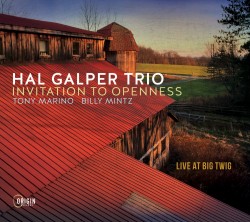MUSIC REVIEW BY Arturo Pepe, Tracce Di Jazz (Italy)
Hal Galper , born in 1938, is one of the great keyboard lions still in business, although he has limited performances, he continues to carry the sacred flame of jazz as an educator, being a Master who does not spare himself (the network is full of extracts from his masterclass) and who has also been able to make an important contribution in music publishing. In the clips that we propose below we find him at the red-hot keyboards of the Cannonball Adderley group, in an interview in which he talks about those years, then in the Phil Woods quintet, with whom he remained for ten years, and then in duo with Lee Konitz, just to clarify the absolute level of this musician who grew up in Boston in the 60s under the aegis of Herb Pomeroy, to be placed carefully in the history of the music we love.
As for the record in question, let's start by saying that the expression Rubato, referring to time, occurs from the times of Chopin and Liszt, and is characterized by a slight increase, or decrease, of the tempo of a piece, at the discretion of the performer, very often a pianist, while maintaining the overall rhythmic tempo of the beats.
Hal Galper has been the interpreter of this rubato technique for at least a quarter of a century. In his works from the 90s onwards we find in fact performances of non-metronomic pieces, which make the style of his piano trios very flexible and his records always very interesting, poised between free form and a concrete development of the bop canon.
For those who are not very familiar with these "recent" works that have passed a bit on the sly, this radio Live can be an excellent opportunity to approach their art. We point out that this "Invitation To Openness" dates back to 2008, when Galperian research, deeply influenced by the seasons with Sam Rivers , was probably at its zenith with the East Coast Trio, completed by Tony Marino on bass and Billy Mintz on drums. A piece that therefore precedes the developments of " Airegin " and " O's Time ", published in the following years by his West Coast trio, all re-readings from the great American songbook with some originals.
Thus, between fluid accelerations and decelerations, passages that Galper has always played and experienced, from Ellington ("Take The Coltrane") to Parker (spectacular " Constellation s") to Gershwin (a long and articulated "Embreaceable You") passing from 'iconic title track and from a classic of ours, "Rapunzel's Launchonette" of which we remembered a version with John Scofield from "Ivory Forest", and which here shines like a magic trinket from the bottom of a drawer, a bit like the entire disc, precious discovery of a great jazzman too underestimated and captures an advanced trio, in total empathy.
The winding streets of jazz are endless and this invitation from Hal Galper's trio's past is one that fans shouldn't let go.
Translated from Italian
As for the record in question, let's start by saying that the expression Rubato, referring to time, occurs from the times of Chopin and Liszt, and is characterized by a slight increase, or decrease, of the tempo of a piece, at the discretion of the performer, very often a pianist, while maintaining the overall rhythmic tempo of the beats.
Hal Galper has been the interpreter of this rubato technique for at least a quarter of a century. In his works from the 90s onwards we find in fact performances of non-metronomic pieces, which make the style of his piano trios very flexible and his records always very interesting, poised between free form and a concrete development of the bop canon.
For those who are not very familiar with these "recent" works that have passed a bit on the sly, this radio Live can be an excellent opportunity to approach their art. We point out that this "Invitation To Openness" dates back to 2008, when Galperian research, deeply influenced by the seasons with Sam Rivers , was probably at its zenith with the East Coast Trio, completed by Tony Marino on bass and Billy Mintz on drums. A piece that therefore precedes the developments of " Airegin " and " O's Time ", published in the following years by his West Coast trio, all re-readings from the great American songbook with some originals.
Thus, between fluid accelerations and decelerations, passages that Galper has always played and experienced, from Ellington ("Take The Coltrane") to Parker (spectacular " Constellation s") to Gershwin (a long and articulated "Embreaceable You") passing from 'iconic title track and from a classic of ours, "Rapunzel's Launchonette" of which we remembered a version with John Scofield from "Ivory Forest", and which here shines like a magic trinket from the bottom of a drawer, a bit like the entire disc, precious discovery of a great jazzman too underestimated and captures an advanced trio, in total empathy.
The winding streets of jazz are endless and this invitation from Hal Galper's trio's past is one that fans shouldn't let go.
Translated from Italian
Soundclips
Other Reviews of
"Invitation to Openness":
Jazz 'N' More (Switzerland) by Georg Modestin
Take Effect by Tom Haugen
Jazz Weekly by George W Harris
All About Jazz by Dan McClenaghan
Midwest Record by Chris Spector
